Australian Healey Statistics and BMC Warranty
Cards
by
Patrick Quinn
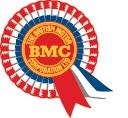
I started all this a few years
back. Like most club members
over the years I have received the issues of the Austin-Healey clubs’
Yearbook and always gave just a cursory glance to the list of members
included with each state’s contribution. It only seems like yesterday
when we were putting together Yearbook number one back in 1977 but so
far there has been a total of twenty-five.
About four year’s back after receiving the Yearbook it
occurred to me that apart from the list of members and their cars of
that year it might be a good idea to keep some form of list of cars
within New South Wales. Starting was simple, as it was just a matter of
obtaining the list of NSW club cars electronically and then going
through each previous Yearbook and adding the detail. Then it
snowballed from there as I thought why I should just restrict myself to
New South Wales and why not the whole of Australia?
In every Yearbook from the very first, each club has published
a list of members and cars. During some years there has been more
detail than others, such as full addresses, chassis numbers, engine
numbers and the like.
To the end of June 2004 it was just a matter of transcribing
the details of each list in each Yearbook to an Excel spreadsheet.
Cross checking as I went all the details of the owners and cars and
changing or adding entries where appropriate. As much detail as
possible was collected including when cars were added to lists, sold or
otherwise. It virtually took on a life of its own as I found myself
scouring Australian car magazines looking for cars for sale and if a
chassis, engine or registration number was included in the
advertisement then I would mark the detail in the register. It has
always been gratifying adding a new car to the list.
In fact as long as a significant number was recorded it stayed
on the register. By significant I soon found that the only numbers that
really mattered were the chassis, engine and body numbers. Some cars
stay on an individual club list for years while others come and go or
perhaps were sold time and time again. Registration numbers would
change many times over during a twenty-four year period and while
sometime useful to match up a car that hadn’t appeared on a club list
for some years such numbers couldn’t be relied upon.
From over twenty-five years of Yearbooks and other sources I
have tallied up 1,288 Healeys and Austin-Healeys. However not for a
moment do I suggest that the register is definitive as I know there are
many more cars in Australia that have never been involved in any club
plus I am certain that some members have cars that haven’t been
included. There is also the chance where I may have included some cars
twice, perhaps due to a chassis number being listed for a couple of
years, then the car disappearing for some time and coming back on a
list with just its engine number being shown. The names against the
vehicle may also be out of date as it’s possible that when a car was
sold in the past the new owner may not have joined any club and
therefore their details would not have been published in any Yearbook.
In no way do I present this list as an official AHOC of NSW
register either. In fact quite the opposite as it’s probably just the
product of an addled brain more than anything else. However I would
like to take it further by adding more details of individual cars. Some
club members have forwarded copies of their Leyland Heritage
Certificate to me and in such cases the information from build dates to
key numbers has been added. Printed out the register extends for 142 A4
pages.
What’s the point in it all? In just a short time I have been
able to provide current owners with information to track the history of
their cars. However the best was when I received a call from a bloke
trying to find out the whereabouts of a 100 that his recently deceased
father-in-law had bought new in Sydney. He and his wife were sorting
the gentleman’s effects and came across the original Driver’s Handbook
and sales documents and they wanted it all to go to the current owner.
Armed with the chassis number it was a simple process to identify the
car as now being in Melbourne. I never think it to be appropriate to
pass out owner’s details so I contacted the Victorian club and the car,
Handbook and papers were reunited. The current owner of the car is the
son of a long-term Austin-Healey owner and member of the Victorian
club, so it was warm feelings all round.
For the statistically minded I have thrown together a few bits
and pieces below but I thought it might be of interest if I were to
itemise the headings of the spreadsheet that contains the details of
the 1,288 entries:
| Owner’s
Name(s): |
Self-explanatory but it’s surname first for
sorting purposes. It’s interesting to see people who have stayed
members for over a quarter of a century. It’s also pleasant to see the
same surnames multiply over time, clearly the children of long-term
members who have obtained cars for themselves. It is equally sad to see
Christian names drop away (usually males) while their spouse’s name
remains.
|
| Address: |
Also self-explanatory but difficult for the
historian
as some clubs have not been included full address but just suburbs. I
have
thought about cross checking through the White Pages on line but there
is a limit. |
| State: |
As the information is state based this was
the primary sort column. Mostly cars stayed within states but there has
been some that have been owned in many different states. This has been
prevalent with quite a few members from the southern states moving to
Queensland and taking their cars with them.
|
| Postcode: |
Someone mentioned that it might be useful to
be able
to sort by postcodes. |
| Phone Number: |
Self-explanatory. Phone numbers are useful
when a car
is advertised for sale and chassis/engine numbers are not supplied. |
| Model: |
Another important sort so to find out the
number of a
particular model within a state or otherwise. However when some states
indicate that a model was a 3000 BT7 or BN7, it’s hard to say if it’s
really
a MkI or MkII. Additionally there have been some years that the only
detail
provided was the model type with nothing else. |
| Chassis Number: |
Obvious? However there are plenty of gaps.
One thing
noticed is that many owners like to drop the letter L from their
previously
left-hand-drive cars. As far as we know there were only ever 24
Austin-Healey
3000s imported new into Australia so I can’t imagine why this is done. |
| Engine Number: |
Yes it is obvious but there is quite a lot of
funny looking
numbers out there that look nothing like the original BMC numbers. Plus
there are a surprising number of cars that share the same engine number. |
| Registration Number: |
Useful but as said before it’s the least
permanent number
associated with any car. |
| Body Number: |
There are very few of these that have been
included on
the various annual lists. |
| Body Colour: |
Initially very little information has been
provided as to body colour but this changed from 2003 when clubs
started to provide the information.
|
| Trim Colour: |
The same as with body colour. |
| Previous Owner: |
This is where it gets interesting. By going
through the
Yearbooks for each year it was possible to trace the cars sold during
the
previous year. The list includes the names and addresses of previous
owners.
As I said some cars have changed hands repeatedly while some have
stayed
with the same owners for the whole period. |
| Previous Reg Number: |
While the registration number is next to
useless as far
as the collection of data is concerned it is still worthwhile to
maintain
details of all known past numbers. |
| Detail: |
This is the area that I would really like to
build on.
It includes such information that may be found on the Heritage
Certificate,
known history about restoration, original sales information and any
other
information about individual cars such as when it was imported into
Australia. |
| Source: |
This indicates where the latest data has come
from. Generally it is from Yearbooks 1 to 25 but there are some other
sources such as applications from new members with cars that have had
no previous entry. Interestingly there are 31 entries or cars that
appeared in Yearbook No 1 from 1977 and have not appeared since.
|
Just for those of us who like statistics.
A break-up individual Healey and Austin-Healey
models
state by state. If you’re wondering what the ‘others’ could possibly
be,
it’s the MacHealey single seater racing car that started life as a BN1
and the other is a Healey Sports Boat. As far as I know there is one
other
Sports Boat in Victoria but no details are known.
|
ACT |
NSW |
Vic |
SA |
Qld |
WA |
Tas |
NT |
Total |
| Warwick Healeys |
0 |
6 |
0 |
0 |
3 |
1 |
0 |
0 |
10 |
| Warwick Austin-Healeys |
0 |
4 |
5 |
2 |
3 |
1 |
0 |
0 |
15 |
| 100 BN1 |
3 |
107 |
172 |
51 |
67 |
41 |
5 |
0 |
446 |
| 100 BN2 |
0 |
25 |
44 |
9 |
11 |
3 |
1 |
0 |
93 |
| 100M |
0 |
1 |
6 |
0 |
2 |
2 |
0 |
0 |
11 |
| 100/6 BN4 |
2 |
33 |
86 |
17 |
24 |
14 |
3 |
0 |
179 |
| 100/6 BN6 |
0 |
7 |
11 |
0 |
3 |
3 |
1 |
0 |
25 |
| 3000 BT7 MkI |
1 |
35 |
54 |
3 |
8 |
9 |
1 |
0 |
111 |
| 3000 BN7 MkI |
0 |
6 |
15 |
5 |
4 |
1 |
0 |
0 |
31 |
| 3000 BT7 MkII |
0 |
12 |
17 |
4 |
6 |
2 |
0 |
0 |
41 |
| 3000 BN7 MkII |
0 |
5 |
4 |
0 |
1 |
0 |
0 |
0 |
10 |
| 3000 BJ7 MkII |
0 |
24 |
41 |
10 |
9 |
4 |
0 |
0 |
88 |
| 3000 BJ8 |
2 |
74 |
82 |
22 |
26 |
18 |
1 |
1 |
226 |
| Others |
0 |
0 |
1 |
0 |
1 |
0 |
0 |
0 |
2 |
|
|
|
|
|
|
|
|
|
|
| Total |
8 |
339 |
538 |
123 |
168 |
99 |
12 |
1 |
1288 |
The above information is current as at 1 January 2005 and is
interesting as it signifies an increase of 36 from when I last tallied
the totals in June 2004. While modest increases have shown up for both
NSW and Victoria it is the smaller clubs like SA, WA and Qld that have
had the largest increases. These have been 7 for SA, 4 for WA and 20
for Queensland. The latter probably has quite a lot to do with members
retiring to warmer climes.
BMC Warranty Cards
Still for the biggest news for six-cylinder
Austin-Healey owners was the uncovering of the original BMC warranty
cards. This came about when a member of the NSW club who used to work
for Peugeot made contact with me. The latter history of Peugeot in
Australia is closely connected to Jaguar, Rover and BMC. Prior to
Peugeot Australia being a stand alone company there were connections
with Jaguar Rover Australia that was previously known as Leyland
Australia and before that the British Motor Corporation. I have
probably missed out on a step or two but for the sake of this it really
doesn’t matter.
It turned out that our club member had been with BMC, Leyland, Jaguar
Rover Australia and Peugeot through all the changes over the years and
had managed to rescue a number of items that may have been lost forever.
Of particular interest to us is that he rescued what I now call the
Austin or BMC warranty cards from the late 1950s through to the end of
the 1960s. Putting one and one together it appears that for every car
sold BMC in those pre-computer days kept a separate filing card that
included detail about the car plus what repairs were done to that car
under warranty.
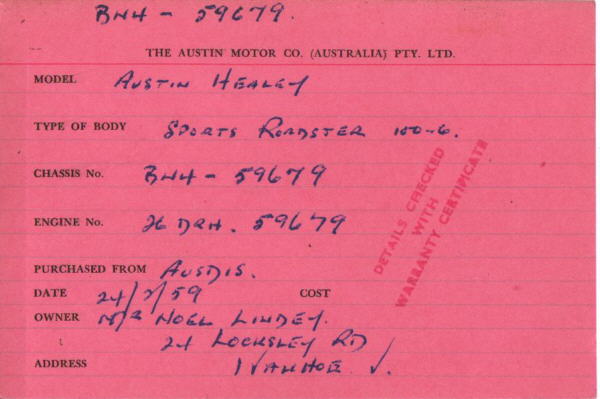
Of greater interest to us as Austin-Healey owners is that amongst
the cards were details of 145 six-cylinder Austin-Healeys and just one
100 BN1. Please don’t ask how the BN1 came into it and there is no
other information on the four-cylinder cars.
The detail on each card does vary but most include chassis and engine
numbers plus the names of the Australian distributor, dealer and
generally the first owner. On some cards there is information on the
colour, key number, tyre and battery types and even what ship the car
came out to Australia on. On the reverse of each card are details of
what warranty repairs were undertaken or in many cases the reverse has
been left blank. Details of the repairs are interesting and include
quite a few broken windscreens, exhaust repairs as well as many engine
and body repairs.
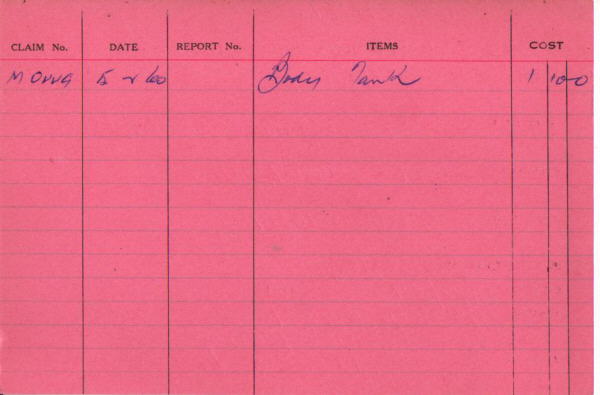
I first thought that each card would have been
established
after a warranty claim was received but as there are quite a few cards
without any repair details included, it can be assumed that a card was
filled out as soon as BMC received the notice of sale from the
dealer/distributor.
This means that the cards probably indicate all the six-cylinder
Austin-Healeys
imported new into Australia. I’m not prepared to say that it is a
definitive
list of all Australian delivered six-cylinder cars but it’s better then
anything else that’s in existence. While the cards were maintained in
Sydney
it includes cars delivered all over Australia.
Perhaps a break down state by state and model by
model
from when the six-cylinder cars were delivered new might be of interest
plus the numbers of cars that are not accounted for:-
|
ACT |
NSW |
Vic |
SA |
Qld |
WA |
Tas |
NT |
Total |
Unknown |
| BN4 |
|
47 |
47 |
12 |
5 |
7 |
|
1 |
119 |
44 |
| BN6 |
|
1 |
1 |
|
|
|
|
|
2 |
1 |
| BT7 MkI |
1 |
1 |
1 |
|
|
|
|
|
3 |
1 |
| BN7 MkI |
|
1 |
2 |
|
|
|
|
|
3 |
|
| BT7 MkII |
|
1 |
|
|
|
|
|
|
1 |
|
| BN7 MkII |
|
|
1 |
|
|
|
|
|
1 |
|
| BJ7 |
|
3 |
2 |
|
|
|
|
|
5 |
|
| BJ8 |
2 |
4 |
2 |
1 |
|
1 |
1 |
|
11 |
1 |
|
|
|
|
|
|
|
|
|
|
|
| Total |
3 |
58 |
56 |
13 |
5 |
8 |
1 |
1 |
145 |
47 |
You can see from the above there are 145 six-cylinder cars that
have BMC warranty cards and comparing the known chassis numbers with
the list of cars that have appeared in the Yearbooks over the years
some 98 are accounted for. This means that 47 six-cylinder
Austin-Healeys have vanished, perhaps destroyed or languishing in
garages across Australia. Looking at percentages that is around a total
of almost 68% of Australian delivered Austin-Healeys accounted for. Not
a bad survival rate.
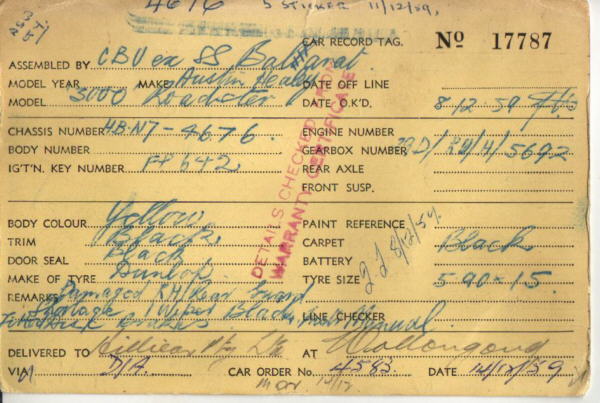
The total for the unknown or unaccounted cars form part of the
overall numbers and are not in addition to the total. To bore you a
little further with some more trivia it is interesting to note that
from the 44 unaccounted BN4s a total of 21 were delivered new to New
South Wales, 14 to Victoria, 5 to South Australia, 2 to Queensland, 1
to Western Australia and 1 to the Northern Territory. The unaccounted
for BN6, BN7 MkI and BJ8 were all delivered new to New South Wales
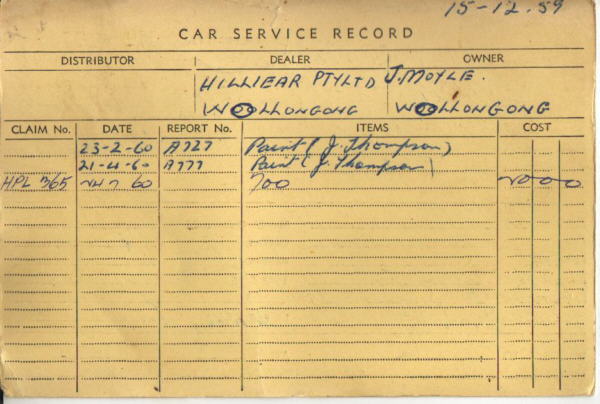
I have listed below the chassis numbers of all the 145
six-cylinder cars plus the 1 BN1 and while I cannot of course provide
current owners with the BMC Warranty Card pertaining to their car I am
quite happy to send a photocopy or scan the card and email it. All you
have to do is ask. Plus if you can, a replied paid envelope would be
appreciated. The chassis numbers have been taken direct from the cards
and do include a few with the letter L which signifies that the car
started life as left hand drive. I don’t understand this but can guess
that it was either an error at the factory or the car was converted
very early in its life.
BN1/223269
BN4/44249, BN4/44269, BN4/44352, BN4/44353, BN4/44361, BN4/44550,
BN4/44552, BN4/44575, BN4/44581, BN4/44715, BN4/44716, BN4/45721,
BN4/45949, BN4/45954, BN4/45956, BN4/46472, BN4/46475, BN4/46737,
BN4/47478, BN4/47564, BN4/47584, BN4/47710, BN4/47882, BN4/47887,
BN4/48972, BN4/50916, BN4/50917, BN4/51681, BN4/51723, BN4/51728,
BN4/51730, BN4/56298, BN4/56300, BN4/56655, BN4/56697, BN4/58124,
BN4/58375, BN4/59679, BN4/59694, BN4/60681, BN4/60980, BN4/O/28358,
BN4/O/31157, BN4/O/42779, BN4/O/44408, BN4/O/44551, BN4/O/44707,
BN4/O/44711, BN4/O/44824, BN4/O/44826, BN4/O/45050, BN4/O/45497,
BN4/O/45819, BN4/O/45824, BN4/O/46121, BN4/O/46168, BN4/O/46346,
BN4/O/46463, BN4/O/46468, BN4/O/46607, BN4/O/46611, BN4/O/46731,
BN4/O/46972, BN4/O/47474, BN4/O/47491, BN4/O/47708, BN4/O/47721,
BN4/O/47774, BN4/O/47885, BN4/O/48241, BN4/O/48966, BN4/O/49828,
BN4/O/50913, BN4/O/50914, BN4/O/50915, BN4/O/51680, BN4/O/51709,
BN4/O/51711, BN4/O/51724, BN4/O/51725, BN4/O/51726, BN4/O/51727,
BN4/O/51729, BN4/O/54395, BN4/O/55451, BN4/O/55455, BN4/O/56009,
BN4/O/56014, BN4/O/56416, BN4/O/56417, BN4/O/56645, BN4/O/56688,
BN4/O/56693, BN4/O/56700, BN4/O/57028, BN4/O/57089, BN4/O/57090,
BN4/O/57091, BN4/O/57284, BN4/O/57414, BN4/O/57450, BN4/O/57487,
BN4/O/57491, BN4/O/57752, BN4/O/59606, BN4/O/60287, BN4/O/60292,
BN4/O/60298, BN4/O/60910, BN4/O/60962, BN4/O/60988, BN4/O/61113,
BN4/O/61159, BN4/O/61985, BN4HL/O/51053, BN4L/8086, BN4L/O/32920,
BN4L/O/54604, BN4L/O/56225
BN6/O/2536, BN6/O/57462
HBT7/O/9535, HBT7/17738, HBT7/19052, HBT7L/10754
HBN7/18442, HBN7/3399, HBN7/4676, HBN7L/13026
HBJ7/22418, HBJ7/22438, HBJ7/24982, HBJ7L/24986, HBJ7L/25075
HBJ8/26740, HBJ8/29376, HBJ8/31256, HBJ8/31257, HBJ8/34683, HBJ8/35999,
HBJ8/40388, HBJ8/41228, HBJ8/82462, HBJ8/31150, HBJ8L/27232
Patrick Quinn
“Wongaburra”
116 Warks Hill Rd.,
Kurrajong Heights
NSW 2758
Australia
(02) 9561 8749 bh
0417 673 065 mob
Email Patrick
Quinn
Home





